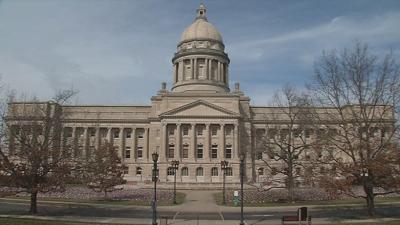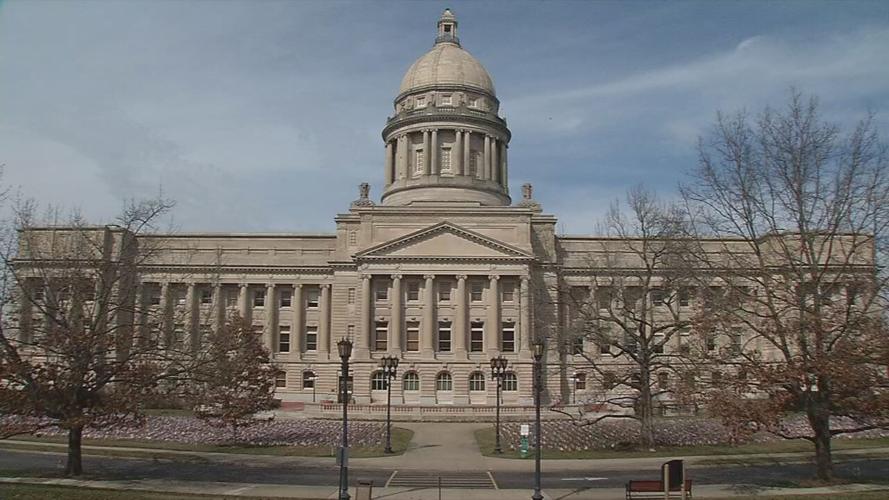FRANKFORT, Ky. (WDRB) -- Legislation providing permanent funding for public charter schools in Kentucky cleared its last legislative hurdle Tuesday before lawmakers break for the session's veto recess.
House Bill 9, sponsored by House Majority Whip Chad McCoy, passed the Senate on a 22-14 vote Tuesday. The legislation allows charter schools to participate in the state’s Support Education Excellence in Kentucky program and directs school districts to transfer portions of their local tax receipts, federal funding, transportation money and other state-issued dollars to charter schools operating within their boundaries.
Charter schools have been legal in Kentucky since 2017, but lawmakers have not set a funding mechanism.
Senate President Pro Tem David Givens said local funding is "absolutely" necessary for charter schools. SEEK is a complex per-student funding formula that includes a mix of state and local tax dollars for school districts.
"It is vitally important that we provide adequate funding for these schools to succeed," said Givens, R-Greensburg. "... When we talk about SEEK funding, we often think it only encompasses what we send down through the general fund. SEEK itself includes local funds, and SEEK will flow to the student because the funds are for educating the students."
Supporters said public charter schools, which operate in most states, will offer families and their children more options for their educations.
“The time has come for us to join the other 44 states and the District of Columbia — blue states, red states — to get charters going and actually get some funding in this area to provide opportunity to kids that really need a chance,” said Sen. Stephen West, R-Paris.
But opponents fear charter schools will siphon money from local school districts as they attract students within districts’ boundaries.
“If I was a taxpayer in this state, I would be livid, livid at this point that we are making this decision when we are so behind in supporting our teachers, supporting our educators and standing up for them,” said Sen. Karen Berg, D-Louisville. “This is a complete abdication of the responsibility of this body, and I truly apologize.”
Sen. David Yates, D-Louisville, questioned the constitutionality of requiring districts to send local tax receipts to charter schools in HB 9.
"I think that at best this looks like the redistribution of local funds might be constitutionally questionable," he said. "I'll let some some stronger minds make that debate."
Kentucky Education Commissioner Jason Glass echoed concerns raised on the Senate floor during Tuesday's vote on the legality of forcing school districts to transfer local tax receipts to charter schools.
HB 9's funding mechanism "creates new constitutional questions relating to the forced transfer of local school funds that ultimately will have to be resolved by the courts," he said in a statement.
"I hope that the General Assembly takes time over the interim to work with education stakeholders on a policy framework that results in better school options for Kentucky’s students," Glass said.
HB 9 also establishes a five-year pilot program with at least one charter school opening as an “urban academy” in Jefferson County and northern Kentucky. Urban academies prioritize enrollment of students who live close to the charter schools, according to HB 9.
The Jefferson County Board of Education would be required to authorize at least one urban academy charter school by July 1, 2023. Northern Kentucky University — or, if the university declines the responsibility, a collective of school board members in counties with four or more school districts — must also approve at least one urban academy charter school to open by July 1, 2023.
Jefferson County Public Schools, Kentucky's largest school district, emerged as a point of contention in Tuesday's floor debate.
Sen. Stephen Meredith, R-Leitchfield, criticized the district's scores on state assessments, particularly the persistent achievement gaps between Black and white students, and highlighted some recent news coverage of JCPS issues, including reporting by WDRB News on the surge of failing grades at the district after nearly an entire school year of remote learning.
"We talk about spending taxpayers' dollars, but there should be a return on those dollars, and obviously that hasn't happened in the Jefferson County school system at all," Meredith said. "Maybe for some students it has."
His comments drew rebukes from some Democratic senators who represent portions of Jefferson County.
"When you take the argument of the deficiency of this system, regardless of how we got there, and lump everybody into a basket and then you say, 'Bad, bad,' when there are people gallantly fighting each and every day to elevate our students, I don't think that's right," said Sen. Gerald Neal, D-Louisville. "I think it's disingenuous."
JCPS Superintendent Marty Pollio alluded to Senate President Robert Stivers, Givens and Meredith in remarks during Tuesday's Jefferson County Board of Education special meeting.
The three senators "spoke at length today about what needs to happen to improve outcomes for students in west Louisville," Pollio said.
"Yet here we are today trying to work and do the process the right way, which is talk to the community, get feedback and work hard to make sure we bring a proposal to our school board and our school board listens and we hear you about what we need to do to improve outcomes," he said before a public forum Tuesday on the district's proposed student assignment overhaul.
"If we really want to improve our outcomes for students, the senator from Leitchfield, the senator from Greensburg and the senator from Manchester will allow us to keep all of our SEEK dollars here in Jefferson County and we'll stop funding their schools, but we'll be looking at outcomes of their schools as well," Pollio said.
HB 9 moves to Gov. Andy Beshear’s desk for his signature or veto. The governor has said he plans to veto the measure if it clears the legislature.
The legislation narrowly passed the state House on a 51-46 vote on March 22. The House will need 51 votes and the Senate will need 20 to override Beshear's anticipated veto and make HB 9 law.
Copyright 2022 WDRB Media. All Rights Reserved.














